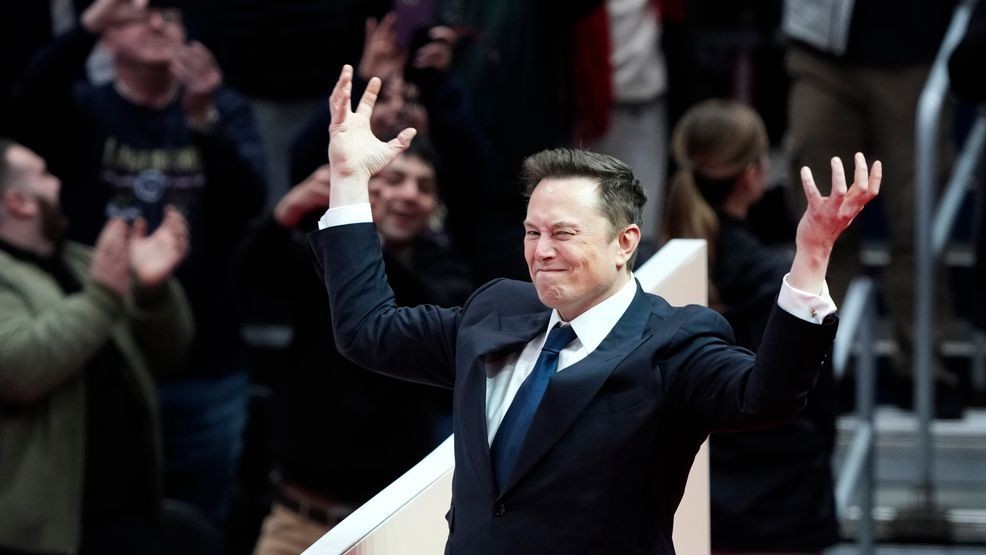(TNND) — Elon Musk, officially designated as a “special government employee” through his work with President Donald Trump’s Department of Government Efficiency, is leading a bid to buy the nonprofit behind ChatGPT maker OpenAI.
OpenAI, meanwhile, just rolled out a version of ChatGPT built specifically for the U.S. government.
And OpenAI is part of a Trump-championed project called Stargate to spend hundreds of billions of dollars to build out the infrastructure intended to power America’s lead in the artificial intelligence arms race.
Trump said the federal government isn’t funding Stargate, which is a venture formed by OpenAI, Oracle and SoftBank.
DOES MUSK HAVE A CONFLICT OF INTEREST?
White House spokeswoman Karoline Leavitt confirmed Musk is a special government employee, and she told reporters that Musk will take steps to avoid conflicts of interest through his work with DOGE.
“The president was already asked and answered this question this week. And he said if Elon Musk comes across a conflict of interest with the contracts and the funding that DOGE is overseeing, then Elon will excuse himself from those contracts,” Leavitt said at the Feb. 5 White House briefing. “And he has, again, abided by all applicable laws.”
Casey Burgat, the Legislative Affairs Program Director at George Washington University, said special government employees serve in a temporary role, typically limited to 130 days per year in an official capacity.
Special government employees are often known experts in a particular field, and presidents might name them as part of a commission or as an adviser.
“It’s this in-between designation that makes this person officially part of the administration,” said Burgat, who also recently wrote a book on political myths. “They can be appointed by the president but don’t require Senate confirmation.”
Special government employees are required to disclose their finances, though Burgat said the records might remain private if the person is unpaid.
And they’re not supposed to make decisions that directly benefit their financial interests unless they get a waiver.
Burgat said Musk’s bid for OpenAI is another example of the web of conflicts that could arise from the world’s richest man having his hand in so much of the technology industry and in so many government operations at the same time.
“He’s obviously incredibly influential in his own right, to say nothing of he owns one of the world’s biggest media companies,” Burgat said of Musk’s ownership of the social media platform X.
Musk also controls Tesla, SpaceX, Neuralink, The Boring Company, and his own AI company, xAI.
“But he also now has access to what I can imagine his competitors would love to know in terms of what the government spends money on, in how much, how much they’re spending on competitors’ contracts,” Burgat said. “So, just the asymmetry of information access, I think presents a lot of conflicts.”
MUSK’S OFFER
Musk is leading a group of investors that gave OpenAI and unsolicited $97.4 billion purchase offer on Monday, according to reports.
OpenAI CEO Sam Altman publicly rejected the offer in a mocking fashion, writing on Musk’s X platform, “(No) thank you but we will buy twitter for $9.74 billion if you want.”
Musk and Altman have been engaged in a long-running feud, according to The Associated Press.
Musk and Altman helped establish OpenAI in 2015 as a nonprofit research lab.
Musk left OpenAI a few years later, and he and Altman have fought over the direction of the company.
Altman plans to convert OpenAI to a for-profit company, which is complicated by Musk’s new bid for control, The Wall Street Journal reported.
WHAT ABOUT STARGATE AND CHATGPT GOV?
AI expert Anton Dahbura said Stargate is a $500 billion effort by OpenAI and others to build data centers across the country.
The data centers will contain huge numbers of processors to be used for training and deploying AI models, such as future versions of ChatGPT.
Trump said Stargate “will be building the physical and virtual infrastructure to power the next generation of advancements in AI.”
Dahbura, the co-director of the Johns Hopkins Institute for Assured Autonomy, said AI holds the promise to take us beyond the limitations of “legacy” software in tackling our most difficult problems.
“These new methods of building systems will be the drivers for innovation into the foreseeable future, so for the United States to enjoy the same level of competitiveness as it’s had in the past many decades, it absolutely must be on the forefront of AI technology,” Dahbura said via email.
Meanwhile, OpenAI on Jan. 28 announced ChatGPT Gov, which is tailored to government needs. The National News Desk’s Geoff Harris reported that this new version will allow government agencies to feed nonpublic sensitive information into OpenAI’s models while still operating within their own hosting environments.
The company said in its announcement that ChatGPT Gov reflects its commitment to helping the government leverage AI to serve the national interest and the public good.
If Musk’s bid to buy OpenAI were successful, it’s unclear how Stargate or ChatGPT Gov might be affected.
“He’s an asterisk in almost every sense of the word,” Burgat said of Musk. “And this is another example of that.”
